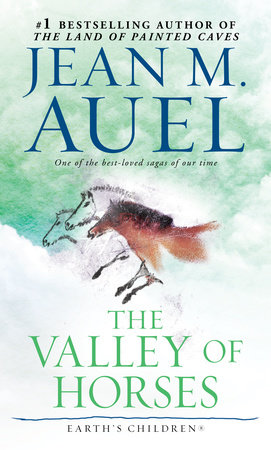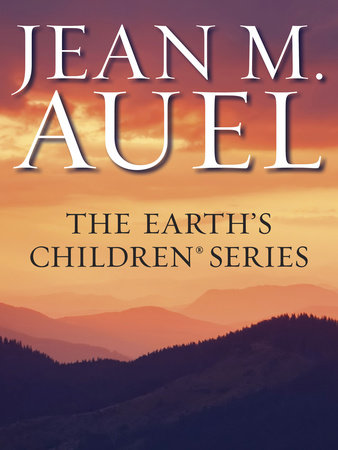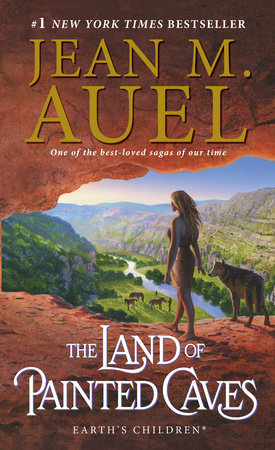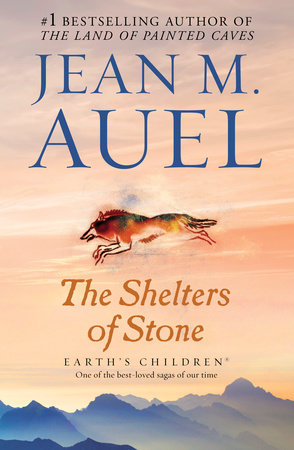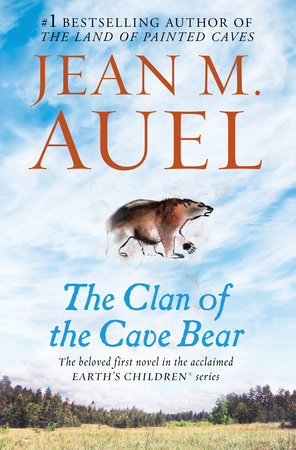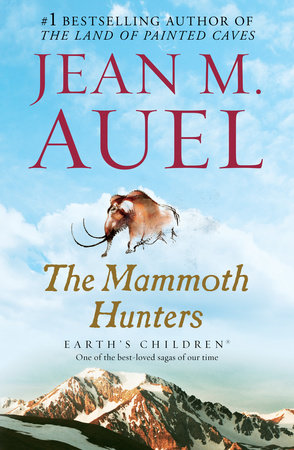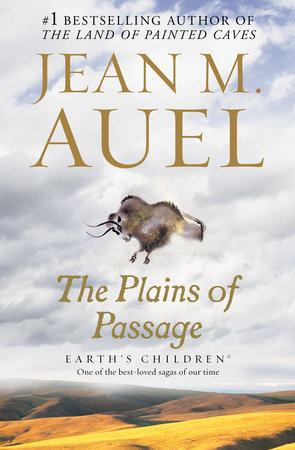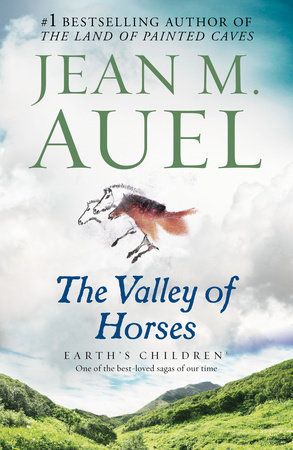Excerpt
The Valley of Horses (with Bonus Content)
Chapter 1
She was dead. What did it matter if icy needles of freezing rain flayed her skin raw. The young woman squinted into the wind, pulling her wolverine hood closer. Violent gusts whipped her bearskin wrap against her legs.
Were those trees ahead? She thought she remembered seeing a scraggly row of woody vegetation on the horizon earlier, and wished she had paid more attention, or that her memory was as good as that of the rest of the Clan. She still thought of herself as Clan, though she never had been, and now she was dead.
She bowed her head and leaned into the wind. The storm had come upon her suddenly, hurtling down from the north, and she was desperate for shelter. But she was a long way from the cave, and unfamiliar with the territory. The moon had gone through a full cycle of phases since she left, but she still had no idea where she was going.
North, to the mainland beyond the peninsula, that was all she knew. The night Iza died, she had told her to leave, told her Broud would find a way to hurt her when he became leader. Iza had been right. Broud had hurt her, worse than she ever imagined.
He had no good reason to take Durc away from me, Ayla thought. He's my son. Broud had no good reason to curse me, either. He's the one who made the spirits angry. He's the one who brought on the earthquake. At least she knew what to expect this time. But it happened so fast that even the clan had taken a while to accept it, to close her out of their sight. But they couldn't stop Durc from seeing her, though she was dead to the rest of the clan.
Broud had cursed her on impulse born of anger. When Brun had cursed her, the first time, he had prepared them. He'd had reason; they knew he had to do it, and he'd given her a chance.
She raised her head to another icy blast, and noticed it was twilight. It would be dark soon, and her feet were numb. Frigid slush was soaking through her leather foot coverings despite the insulating sedge grass she had stuffed in them. She was relieved to see a dwarfed and twisted pine.
Trees were rare on the steppes; they grew only where there was moisture enough to sustain them. A double row of pines, birches, or willows, sculptured by wind into stunted asymmetrical shapes, usually marked a watercourse. They were a welcome sight in dry seasons in a land where groundwater was scarce. When storms howled down the open plains from the great northern glacier, they offered protection, scant though it was.
A few more steps brought the young woman to the edge of a stream, though only a narrow channel of water flowed between the ice-locked banks. She turned west to follow it downstream, looking for denser growth that would give more shelter than the nearby scrub.
She plodded ahead, her hood pulled forward, but looked up when the wind ceased abruptly. Across the stream a low bluff guarded the opposite bank. The sedge grass did nothing to warm her feet when the icy water seeped in crossing over, but she was grateful to be out of the wind. The dirt wall of the bank had caved in at one place, leaving an overhang thatched with tangled grass roots and matted old growth, and a fairly dry spot beneath.
She untied the waterlogged thongs that held her carrying basket to her back and shrugged it off, then took out a heavy aurochs hide and a sturdy branch stripped of twigs. She set up a low, sloping tent, held down with rocks and driftwood logs. The branch held it open in front.
She loosened the thongs of her hand coverings with her teeth. They were roughly circular pieces of fur-lined leather, gathered at the wrist, with a slit cut in the palms to poke her thumb or hand through when she wanted to grasp something. Her foot coverings were made the same way, without the slit, and she struggled to untie the swollen leather laces wrapped around her ankles. She was careful to salvage the wet sedge grass when she removed them.
She laid her bearskin wrap on the ground inside the tent, wet side down, put the sedge grass and the hand and foot coverings on top, then crawled in feet first. She wrapped the fur around her and pulled the carrying basket up to block the opening. She rubbed her cold feet, and, when her damp fur nest warmed, she curled up and closed her eyes.
Winter was gasping its last frozen breath, reluctantly giving way to spring, but the youthful season was a capricious flirt. Amid frigid reminders of glacial chill, tantalizing hints of warmth promised summer heat. In an impulsive shift, the storm broke during the night.
Ayla woke to reflections of a dazzling sun glinting from patches of snow and ice along the banks, and to a sky deep and radiantly blue. Ragged tatters of clouds streamed far to the south. She crawled out of her tent and raced barefoot to the water's edge with her waterbag. Ignoring the icy cold, she filled the leather-covered bladder, took a deep drink, and ran back. After relieving herself beside the bank, she crawled inside her fur to warm up again.
She didn't stay long. She was too eager to be out, now that the danger of the storm had passed and the sunshine beckoned. She wrapped on foot coverings that had been dried by body heat and tied the bearskin over the fur-lined leather wrap she had slept in. She took a piece of dried meat out of the basket, packed the tent and hand coverings, and went on her way, chewing on the meat.
The stream's course was fairly straight and slightly downhill, and the going was easy. Ayla hummed a tuneless monotone under her breath. She saw flecks of green on the brush near the banks. An occasional small flower, bravely poking its miniature face through melting patches of snow, made her smile. A chunk of ice broke loose, bumped along beside her for a pace, then raced ahead, carried by the swift current.
Spring had begun when she left the cave, but it was warmer at the southern end of the peninsula and the season started earlier. The mountain range was a barrier to the harsh glacial winds, and maritime breezes off the inland sea warmed and watered the narrow coastal strip and south-facing slopes into a temperate climate.
The steppes were colder. She had skirted the eastern end of the range, but, as she traveled northward across the open prairie, the season advanced at the same pace. It never seemed to get warmer than early spring.
The raucous squeals of terns drew her attention. She glanced up and saw several of the small gull-like birds wheeling and gliding effortlessly with wings outstretched. The sea must be close, she thought. Birds should be nesting now--that means eggs. She stepped up her pace. And maybe mussels on the rocks, and clams, and limpets, and tide pools full of anemones.
The sun was approaching its zenith when she reached a protected bay formed by the southern coast of the mainland and the northwestern flank of the peninsula. She had finally reached the broad throat connecting the tongue of land to the continent.
Ayla shrugged off her carrying basket and climbed a craggy outcrop that soared high above the surrounding landscape. Pounding surf had cleaved jagged chunks of the massive rock on the seaward side. A bevy of dovekies and terns scolded with angry squawks when she collected eggs. She broke open several and swallowed them, still warm from the nest. She tucked several more into a fold of her wrap before climbing down.
She took off her footwear and waded into the surf to wash sand from mussels pried loose from the rock at water level. Flowerlike sea anemones drew in mock petals when she reached to pluck them from the shallow pools left stranded by the receding tide. But these had a color and shape that were unfamiliar. She rounded out her lunch with a few clams instead, dug from the sand where a slight depression gave them away. She used no fire, enjoying her gifts raw from the sea.
Surfeited on eggs and seafood, the young woman relaxed at the foot of the high rock, then scaled it again to get a better view of the coast and mainland. Hugging her knees, she sat on top of the monolith and looked out across the bay. The wind in her face carried a breath of the rich life within the sea.
The southern coast of the continent curved in a gentle arc toward the west. Beyond a narrow fringe of trees, she could see a broad land of steppes, no different from the cold prairie of the peninsula, but not a single sign of human habitation.
There it is, she thought, the mainland beyond the peninsula. Where do I go now, Iza? You said Others were there, but I don't see anyone at all. As she faced the vast empty land, Ayla's thoughts drifted back to the dreadful night Iza died, three years before.
"You are not Clan, Ayla. You were born to the Others; you belong with them. You must leave, child, find your own kind."
"Leave! Where would I go, Iza? I don't know the Others, I wouldn't know where to look for them."
"North, Ayla. Go north. There are many of them north of here, on the mainland beyond the peninsula. You cannot stay here. Broud will find a way to hurt you. Go and find them, my child. Find your own people, find your own mate."
She hadn't left then, she couldn't. Now, she had no choice. She had to find the Others, there was no one else. She could never go back; she would never see her son again.
Tears streamed down Ayla's face. She hadn't cried before. Her life had been at stake when she left, and grief was a luxury she could not afford. But once the barrier was breached, there was no holding back.
"Durc . . . my baby," she sobbed, burrowing her face in her hands. Why did Broud take you away from me?
She cried for her son, and for the clan she had left behind; she cried for Iza, the only mother she could remember; and she cried for her loneliness and fear of the unknown world awaiting her. But not for Creb, who had loved her as his own, not yet. That sorrow was too fresh; she wasn't ready to face it.
When the tears had run their course, Ayla found herself staring at the crashing surf far below. She watched the rolling breakers spout up in jets of foam, then swirl around the jagged rocks.
It would be so easy, she thought.
No! She shook her head and straightened up. I told him he could take my son away, he could make me leave, he could curse me with death, but he could not make me die!
She tasted salt, and a wry smile crossed her face. Her tears had always upset Iza and Creb. The eyes of people in the Clan did not water, unless they were sore, not even Durc's. There was much of her in him, he could even make sounds the way she could, but Durc's large brown eyes were Clan.
Ayla climbed down quickly. As she hoisted her carrying basket to her back, she wondered if her eyes were really weak, or if all the Others had watering eyes. Then another thought echoed in her mind: Find your own people, find your own mate.
The young woman traveled west along the coast, crossing many streams and creeks that found their way to the inland sea, until she reached a rather large river. Then she veered north, following the rushing waterway inland and looking for a place to cross. She passed through the coastal fringe of pine and larch, woods which boasted an occasional giant dominating dwarfed cousins. When she reached the continental steppes, brush of willows, birches, and aspens joined the cramped conifers that edged the river.
She followed every twist and turn of the meandering course, growing more anxious with each passing day. The river was taking her back east in a general northeasterly direction. She did not want to go east. Some clans hunted the eastern part of the mainland. She had planned to veer west on her northward trek. She did not want to chance meeting anyone who was Clan--not with a death curse on her! She had to find a way to cross the river.
When the river widened and broke into two channels around a small gravel-strewn island with brush clinging to rocky shores, she decided to risk a crossing. A few large boulders in the channel on the other side of the island made her think it might be shallow enough to wade. She was a good swimmer, but she didn't want to get her clothes or basket wet. It would take too long for them to dry, and the nights were still cold.
She walked back and forth along the bank, watching the swift water. When she decided upon the shallowest way, she stripped, piled everything into her basket, and, holding it up, entered the water. The rocks were slippery underfoot, and the current threatened to unbalance her. Midway across the first channel, the water was waist high, but she gained the island without mishap. The second channel was wider. She wasn't sure if it was fordable, but she was almost halfway and didn't want to give up.
She was well past the midpoint when the river deepened until she was walking on tiptoe with the water up to her neck, holding the basket over her head. Suddenly the bottom dropped. Her head bobbed down and she took an involuntary swallow. The next moment she was treading water, her basket resting on top of her head. She steadied it with one hand, trying to make some progress toward the opposite shore with the other. The current picked her up and carried her, but only for a short distance. Her feet felt rocks, and, a few moments later, she walked up the far bank.
Leaving the river behind, Ayla traveled the steppes again. As days of sunshine outnumbered those of rain, the warming season finally caught up and outpaced her northward trek. The buds on trees and brush grew into leaves, and conifers extended soft, light green needles from the ends of branches and twigs. She picked them to chew along the way, enjoying the light tangy pine flavor.
She fell into a routine of traveling all day until, near dusk, she found a creek or stream, where she made camp. Water was still easy to find. Spring rains and winter melt from farther north were overflowing streams and filling draws and washes that would be dry gullies or, at best, sluggish muddy runnels later. Plentiful water was a passing phase. The moisture would be quickly absorbed, but not before it caused the steppes to blossom.


